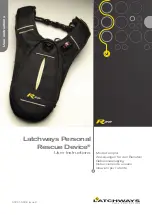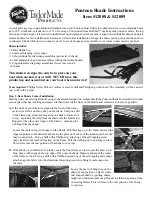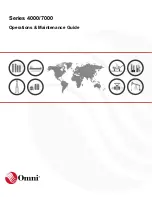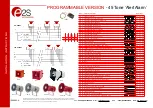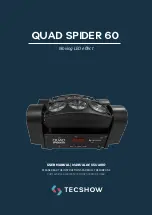
14
UK
Personal Rescue Device
User Instruction Manual
6.1.2 Harness
s #
heck the legibility of the product markings on the harness.
s #HECKALLWEBBINGFORSIGNSOFCUTSABRASIONFRAYINGTEARSBURNSMOULDDISCOLOURATIONORCHEMICALATTACK
If the harness has been subjected to paint overspray, it must not be used.
s #HECKALLSTITCHINGFORSIGNSOFLOOSENINGPULLINGORCUTTHREAD4HEREMUSTBENOEVIDENCEOFDAMAGEDSTITCHING
on either side of the stitch pattern.
s "UCKLESMUSTBEFREEFROMRUSTEXCESSIVEWEARDISTORTIONSORCRACKS
WARNING! Each harness is designed to arrest a fall from height only
once. If subjected to an arrested fall the harness must be withdrawn
from service and destroyed to ensure that it is not used again.
6.2 Periodic examination
These are the checks that should be carried out by a competent person other than the user. The PRD will
be a key component in your emergency rescue plan and as such, periodic examination should be conducted
ATLEASTONCEEVERYMONTHSHOWEVERLOCALSTATEGOVERNMENTALANDJURISDICTIONALAGENCIESMAYREQUIRE
more frequent or mandatory periodic examinations of which the user is required to comply. Additionally,
environmental conditions may be such that more frequent periodic examinations may also be necessary.
The periodic examination should be recorded in the periodic examination log.
A copy of the Latchways PRD Periodic Examination Guide is available to download from:
www.latchways.com
The service life of the PRD, based upon its textile elements, has been evaluated to be up to 10 years.
However, the following factors such as (but not limited to): environmental conditions (eg contact with
chemicals, exposure to temperatures >60ºC (>140ºF)), incorrect storage, frequency of use, may reduce
the service life.
6.3 Basic maintenance, storage and transportation
If required, you may clean the PRD exterior of light soiling, with warm water (40°C) with pure soap or mild
detergent. Avoid getting soap/detergent into adjuster buckles and quick release buckles. After cleaning,
rinse thoroughly with fresh clean water then remove excess water with a dry cloth. Allow to dry naturally,
away from direct heat, then examine fully before storing.
Store in a cool, dry, clean environment. Ensure the PRD is protected from extreme humidity, dust, oil and
direct sunlight. If the PRD is wet, allow to dry naturally before storage. Inspect the PRD after long periods
of storage. During transportation the device must be protected to prevent damage or contamination.
Lubrication of the equipment is not required and no maintenance, other than cleaning, should be undertaken.
This requires actions by the competent person that do not require parts to be replaced but will require the
device to be temporarily removed from service e.g. cleaning.
WARNING! The continued efficiency and durability of the PRD is
dependent on regular periodic examinations.

